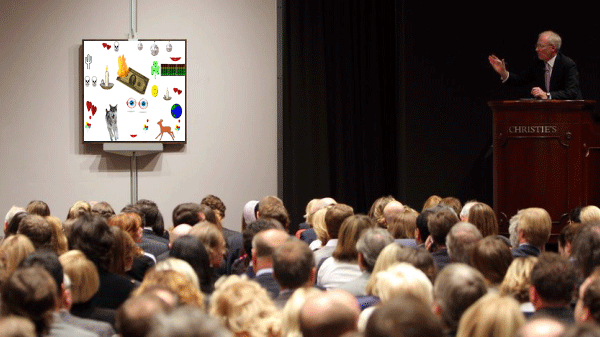
Image via: c-monstah
Here’s the scenario: Your friend at Charity X wants you to donate one of your paintings to their upcoming fundraising auction. You’re on the fence, but she mentions the tax deduction, and so you agree. After your painting sells at the event, you get a letter from Charity X, intended for your tax records, stating the price your piece sold for.
This scenario is misleading to the artist. The charity is implying that you can take a tax deduction that you are not actually entitled to.
I want to pause and say that I think most charities are doing good work and don’t intend to mislead artists. But many of them hope the rosiest possible scenario is true, and haven’t checked the facts.
So here they are.
Your painting is what the IRS calls a “self-created asset.” As such, the rules are clear: you can only deduct the cost of the materials. And let’s face it — for most artists, much of the value is in the labor — the materials by comparison are minor. You don’t get to deduct labor. Furthermore, if you are deducting the cost of all of your art materials as part of your business as a professional artist, then you have already taken the full deduction you’re allowed for that painting, before you ever donate it to the auction. In other words, when you donate your painting to the auction, you get karma, joy, and societal good, but you get zero tax deduction.
Charity X has some vague notion that there is a way to donate artwork that is advantageous to the donor. And there is! But it only applies to people who buy and later donate art. The rules are tricky, and it doesn’t apply to this charity auction scenario, and it doesn’t apply to artists donating their own work.
A better practice for Charity X would be to send you a letter acknowledging your donation, and the sale price. But because leaving it there invites the misunderstanding that that sales price is your tax deduction, they should clarify, as I have above, what (narrow) range of options you are actually entitled to take. Ideally, Charity X would drop the tax deduction talk altogether when soliciting your donation. It’s misleading, and therefore not a healthy business practice. If they’re doing great work – and they probably are – they should appeal to your belief in that work. For artists, who are generous and community-minded, this is likely enough.
All in all, this isn’t quite the deal many artists had in mind when agreeing to donate art work. There is almost no tax benefit. So let me offer a piece of unsolicited business-management advice to help artists with the stream of donation requests. Set yourself a budget for donations. Pick a reasonable amount of work you want to give to good causes, say, 5 pieces (of course that depends – are they inkjet prints or bronze statues?) and call that your donation allowance for the year. When you hit that number, you can say “You’re welcome to ask me next year, but I’ve reached my budget for donated work this year.” This may clarify your own priorities on exactly which charities you want to support. And it can help counter that feeling of exploitation by putting you back in control.
DISCLAIMER: True tax advice is a two-way conversation, and your accountant needs to hear your full situation to apply the rules correctly in your case. This post is meant for general information only.
Hannah Cole is an artist and an Enrolled Agent. She is the founder of Sunlight Tax.


Comments on this entry are closed.